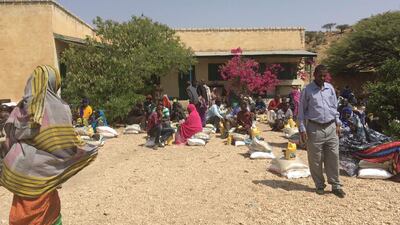DUBAI // Aid groups warn that more Somali youth will turn to violence and join pirate gangs if jobs and skills training are not made available. Pirate networks prey on youth and families reeling under the effect of drought, unemployment and poverty, said aid workers, who call for the international community to step in with help.
“For so many years piracy had reduced. Now, it seems to be coming again. We are seeing youth again going to sea to abduct ships. The crisis is reappearing,” said Omer Farah, director of the Taakulo Somali Community, a non-government organisation that distributes food and provides education and health assistance.
“The No. 1 problem is lawlessness and people are suffering because of drought. When many young people don’t have income sources, but they know how to work with the gun, it could make them turn to piracy if we don’t tackle the problem.”
The group also conducts awareness campaigns against drug addiction, and warns youth against succumbing to the lure of piracy.
“There must be job opportunities for the youth, they need training so their attention can be diverted to other sectors, they learn to work on their own and support their family,” Mr Farah said.
“We tell young men that pirates kill innocent people and take the property of others. We talk about how piracy is a crime against humanity.”
A cholera epidemic has worsened the situation brought about by drought, alleviated only to a small degree by humanitarian aid sent by the United Nations and countries across the world. There have been 738 deaths and 45,400 cases of cholera since the start of the year, according to the World Health Organisation.
The number of people needing assistance, according to the UN, increased from five million in September 2015 to more than 6.2 million in February 2017 -- more than half of the country’s population. About 363,000 acutely malnourished children need nutrition support, including life-saving treatment for more than 71,000 severely malnourished children. Without access primary health-care services, 1.9 million people may die of preventable diseases.
The UAE has sent food aid, water, medical supplies, tents, bedding and clothing. It also supports development projects and UAE doctors provide medical care through mobile hospitals. Both private and government organisations have raised millions of dirhams to provide basic necessities to fight hunger.
And despite an attack in Mogadishu on a team from the Emirates Red Crescent Authority in April, the UAE continues to conduct development work. No one was injured in April bombing.
While Somalia has been grateful for the humanitarian aid it has received, long-term training and employment linked to the fishery sector and job creation along the coast was sorely needed, said Mohammed Ahmed, executive director of the Somaliland Counter Piracy Coordination Office.
“Our waters contain large stocks of fish. We need commercial partnerships with industrial leaders and investors to create jobs for the youth in order not to be attracted to illegal activities. If immediate international assistance is not available, pirates may overcome Somaliland government resistance. As long as Somali youth have access to arms and no means to earn a living, the threat of piracy is real.”
Illegal fishing remains a concern with local communities, which complain about international trawlers straying into Somali waters.
“Somali fishermen, whether in a perceived or real (threat), believe fishing fleets in Somali waters are illegal and unregulated,” Mr Ahmed said.
Following the recent attacks on dhows, Peter Cook, director of the consultancy PCA Maritime, said small boats must be cautious. “Smaller vessels should avoid going too close to Somali waters and staying out of the Exclusive Economic Zone of Somalia, or 200 nautical miles from the shoreline, as Somalia looks upon this area as their exclusive fishing area and may look upon other fishing vessels in this area as imposters and therefore prone to attack.”


